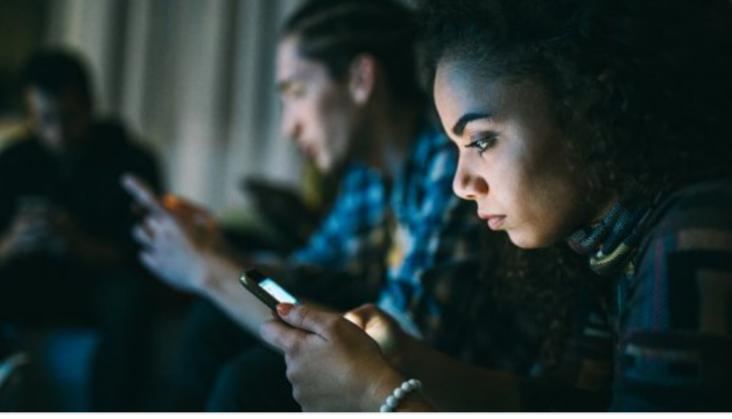Africa-Press – Mauritius. In over just two decades, the Internet has become a new drug, and a means of domination exploited by neo-liberal giants such as Google, Facebook or Netflix as well as a growing number of countries.
We won’t sing the praises of the pre-Internet world. Those who were around before it know that this technological tool has changed everything, often for the better.
We still remember, along with a thousand other difficulties, the obstacles to overcome in order to access the most basic information, those obstinate fax machines or how long it would take for a letter to go across the world.
No, it wasn’t better before, at least for this aspect of our lives. The Internet has radically changed our lives by allowing us to work, communicate and entertain ourselves with the click of a button. It also provides us with a wealth of knowledge accessible to everyone at any moment. What more could one wish for?
But today, after more than two decades of using the Internet, we must ask ourselves a fundamental question: Does the Internet serve to liberate us or to transform us into consenting slaves? Has this tool of liberation turned into a tool of domination?
A virtual drug A brilliant and important book on this subject is Irresistible: The Rise of Addictive Technology and the Business of Keeping Us Hooked by Adam Alter, Professor of Marketing at New York University.
He tells us that the Internet is a new kind of drug that, although immaterial and virtual, has equally harmful consequences. More than half of the population of the developed world is addicted to their smartphone, e-mail, video games, Facebook, Instagram or Netflix.
The conglomerates that own these products develop sophisticated strategies aimed at exploiting flaws in the human psyche (narcissism, search for validation, etc.) with the aim of making them literally irresistible. They create what psychologists call a “behavioural addiction”, i. e.
“addictions in which the object of the addiction is not a psychotropic product, but a behaviour.
” Thus, the “drug addict” can no longer do without the Internet and its associated products. It becomes his raison d’être and he can no longer control himself.
The effects can be disastrous: isolation, depression, unhappiness or financial ruin for those addicted to online gambling. The word “drug” may seem excessive, but it is the right word.
You only need to surf social media for a few hours to realise that these sites are driving us “crazy”. There are those who change their profile picture every day, those who feel the need to comment on current events every ten minutes, or those who use it as a way to vent.
It brings out some of the worst traits of humanity, such as voyeurism and exhibitionism, creating a circus of shameless egos off on a never ending quest to satisfy their lust for phoney admiration.
Social media reminds us of Simone de Beauvoir’s novel, Les Belles Images, which explores the paradox of those who create a certain beautiful image of themselves for the outside world, all the while masking their despair and loneliness.
These images which are created to provoke admiration and envy from others are, in a sense, contemporary gods. They encourage narcissism and a feeling of triumph arising from someone else’s subjugating gaze.
Neoliberal colonisation It gets worse. This drug certainly doesn’t kill anyone, at least not directly. In fact, It can even be considered harmless. However, it’s important to study the effects of this drug on minds manipulated in the context of a neo-liberal economy based on desire.
How to elicit desire in a person is something that corporations like Google, Facebook and Netflix study and learn how to manipulate. A person who spends most of their time in a virtual ecosystem surrenders their imagination, our most intimate and powerful tool, to machines.
They give these conglomerates the keys to their soul who, in turn, use this precious information to make money. Unlocking this desire is a necessary step into turning an individual into a consumer and an eager footsoldier of capitalism.
Knowing one’s desire, what is in one’s heart, is to be able to direct it towards other desires. We should ask ourselves whether we are really free to make our own choices.
Who decides how we relate to the world as we try to manage and tame it? It’s clear that this colonisation of our imagination and bodies is at the very heart of the neo-liberal economic project.
Dystopian security landscapes There are, however, more serious issues. Today we are witnessing the rise of a fully-fledged dystopian security landscape in which countries are developing outright totalitarian control systems.
It consists, through AI in particular, of recording and supervising the slightest movements and inflections of every individual. It is necessary, as Foucault wrote, to monitor and punish.
It is no longer enough to just spy on bodies. One must also spy on souls, to insert oneself into them, to penetrate into the intimacy of each being, in order to literally steal their dreams.
This is not science fiction. The fate of the Uyghurs, more than a million of whom are held in “re-education” camps in China, is a perfect illustration of this.
According to journalist Sylvie Lasserre, quoted in an article published by the French news website Mediapart, “the state has created huge, gigantic databases where it records DNA data, faces and profiles of each person.
” German journalist Kai Strittmatter said in the same article : “Xinjiang is a laboratory.
One of the most powerful instruments of mass surveillance is the Integrated Joint Operations Platform (IJOP), a system built on artificial intelligence, which collects data on all citizens and whose algorithms then warn of the presence of potential suspects.
” It is dangerous to believe that these dystopias are the exclusive domain of totalitarian countries.
They are on our doorstep. They are waiting for us. The time of the human-machine has arrived. We are all like Joseph K. , guilty of a crime of which we know nothing about and yet condemned to die.
I began this article by saying that the Internet is a globally positive development and that we can’t go backwards. However, this marvellous tool is also being used for new and less subtle forms of domination.
Humans, for as long as they have been around, have dreamed of absolute power. The kind of power that would allow one to dominate and domesticate the other entirely.
However, humanity was left with an apparently impossible frontier to cross, that of our consciousness, irreducible and resolutely free. The realisation of this fantasy is now within reach. It is a tragic irony therefore that often we are the consenting victims of this enslavement. We are the junkies of the new slavery.
For More News And Analysis About Mauritius Follow Africa-Press







